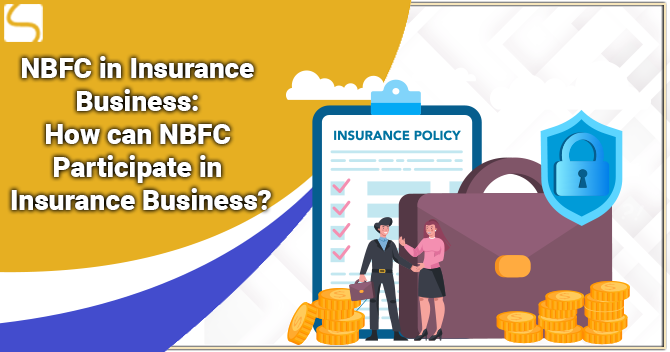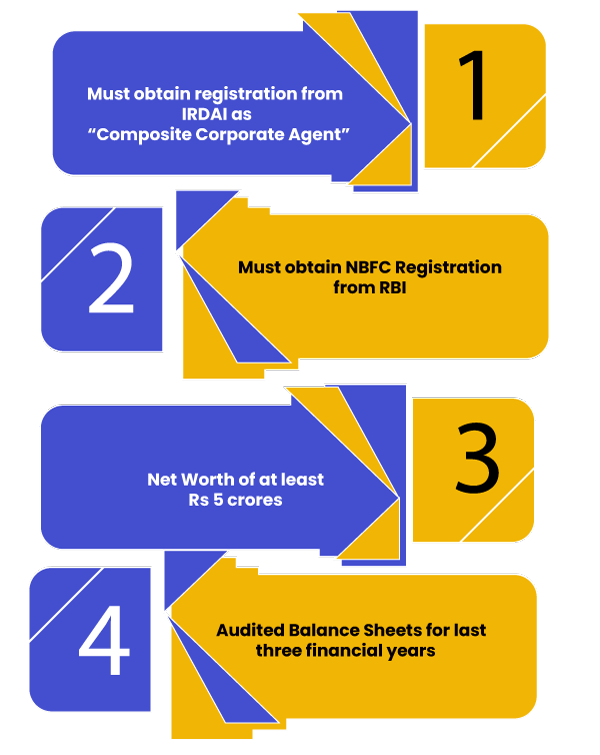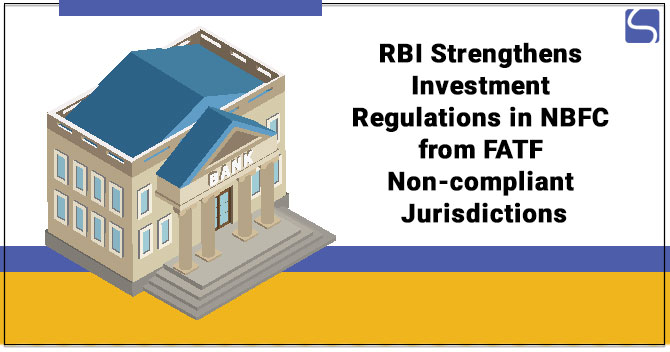NBFC in Insurance Business: How can NBFC Participate in Insurance Business?

Shivani Jain | Updated: Jan 28, 2021 | Category: NBFC
“NBFC”, whenever we hear this term, it makes us realize that it a company incorporated under the provisions of the Companies Act 2013, but for regulation, the owner needs to obtain NBFC Registration from RBI. However, the question is that can an NBFC operate in Insurance Business? The answer to this is that the RBI has allowed the operation of an NBFC in Insurance Business.
However, it shall be taken into consideration that NBFCs are not allowed to operate in an independent framework and needs to follow the guidelines issued by the Apex Bank through the Circular No. DNBS (PD)CC No.13/02.01/99-2000, issued on 20.06.2006.
In this blog, we will discuss in depth about the concept of NBFC in Insurance Business.
Table of Contents
Concept of Insurance Business
The term “Insurance” denotes a contract in which a person receives financial safeguard and reimbursement of damages from the insurance company or insurer. That means, insurance means a sort of protection against the possible losses.
Further, the concept of Insurance is based on the notion that an insurer will opt to spend small timely amounts against the chances of a huge unexpected loss.
Requirements for Participation of NBFC in Insurance Business
RBI has allowed the participation of NBFC in Insurance Business based on the conditions as follows:
- NBFCs must notuse any practice that restricts the Customer’s Interest to work with some alternative agencies in regard to financed assets;
- NBFCs must mention in the publicity material that the acceptance of insurance product is fully voluntary in nature;
- The Insurer needs to pay the insurance premium directly to the concerned insurance company without involving the NBFC;
- NBFCs are not allowed to share their risk with the Insurance Agencies;
- There must not be any linkage involved between the financial services provided by NBFC, its customers, and the usage of the insurance products;
Eligibility Criteria for Participation of NBFC in Insurance Business
The eligibility criteria for participation of NBFC in Insurance Business are as follows:

- Must obtain registration from IRDAI (Insurance Regulatory and Development Authority of India) as “Composite Corporate Agent”;
- Must obtain NBFC Registration from RBI under the provisions of the RBI Act 1935;
- Should have the Net Worth of at least Rs 5 crores;
- Must have Audited Balance Sheets for the last three financial years;
Concept of Insurance Joint Ventures
Whenever, an NBFC satisfies all the conditions of the eligibility criteria and wants to start an Insurance Joint Venture with the equity contribution on risk participation basis or wants to make investments in the Insurance Companies, would require approval from RBI on a mandatory basis.
Further, the maximum equity contribution required by an NBFC to start a joint venture is 50% of the total paid up capital of the Insurance Company.
However, a subsidiary company involved in the operations of banking business or non banking financial company shall not be permitted to join an insurance company based on risk participation.
Eligibility Criteria for Participation of NBFC in Insurance Joint Ventures
The eligibility criteria for the participation of NBFC in Insurance Joint Ventures are as follows:
- Must be registered with the Reserve Bank of India;
- Must have a Net Worth of at least Rs 500 crores;
- The CAR (Capital Adequacy Ratio) of an NBFC, engaged in loan and investments activities must not be more than 15%. However, for any other NBFC the CAR must not be more than 12%;
- The NPAs (Non Performing Assets) of an NBFC must not be more than 5% of the total outstanding leased or hire purchase assets and advances;
- NBFC must have profits for at least last three consecutive financial years;
- All the subsidiaries of an NBFC must have an exemplary track record in rendering services;
Consequences if an NBFC fails to satisfy Eligibility Criteria
However, if in case an NBFC fails to satisfy the criteria of becoming a part of a joint venture, the same can make investments up to 10% of the Total Owned Fund or of Rs 50 crores, whichever is less, in the insurance company. However, such a funding need to be accepted as an investment which is free from all sorts of contingent liability for an NBFC.
Further, the eligibility criteria for such NBFCs are as follows:
- The CRAR of the Non Banking Financial Company must not be less than 12%, if in case the same is engaged in hire purchase, equipment leasing, or finance activities. However, if the same is a loan or an investment company, then, in that case, the CRAR will be 15%;
- The total level of NP A (Non Performing Assets) must not be more than 5% of the total outstanding hire purchase or leased assets, and advances;
- A Non Banking Financial Company must have net profits for the last three financial years;
Other Provisions for NBFC in Insurance Business
If in case a foreign company contributes around 26% or more with the approval of IRDAI (Insurance Regulatory Development Authority of India) or FIPB (Foreign Investment Promotion Board), then, in that case, more than one NBFC will be permitted to participate in the said joint venture. However, the same is possible only if all the participating NBFCs are able to satisfy the setting up criteria.
Conclusion
In a nutshell, RBI is working hard to incorporate as many NBFCs as possible to enter the market of Insurance. If in case an NBFC is not that big, then also, the same can enter the world of insurance by operating as agents to the Insurance Companies. This will assist the small NBFCs to enter the market risk-free. Moreover, the same assist the smaller NBFCs in entering the market in a risk free manner.
However, the large NBFCs have great potential and capacity to handle risks, and therefore, they are permitted to set up a Joint Venture undertaking insurance business.
All the reasons encourage a new comer to move further in the Insurance sector and benefit from the booming growth. As a result, the new companies are looking forward to start their business operation by acquiring NBFC Registration from RBI.
In case of any other doubt or dilemma, collaborate with Swarit Advisors our experienced professionals are there to cater to all your needs and doubts. Also, they will guide you with best and the hassle free way to obtain NBFC Registration in India.
Also, Read: Cancellation or Surrender of NBFC Registration















